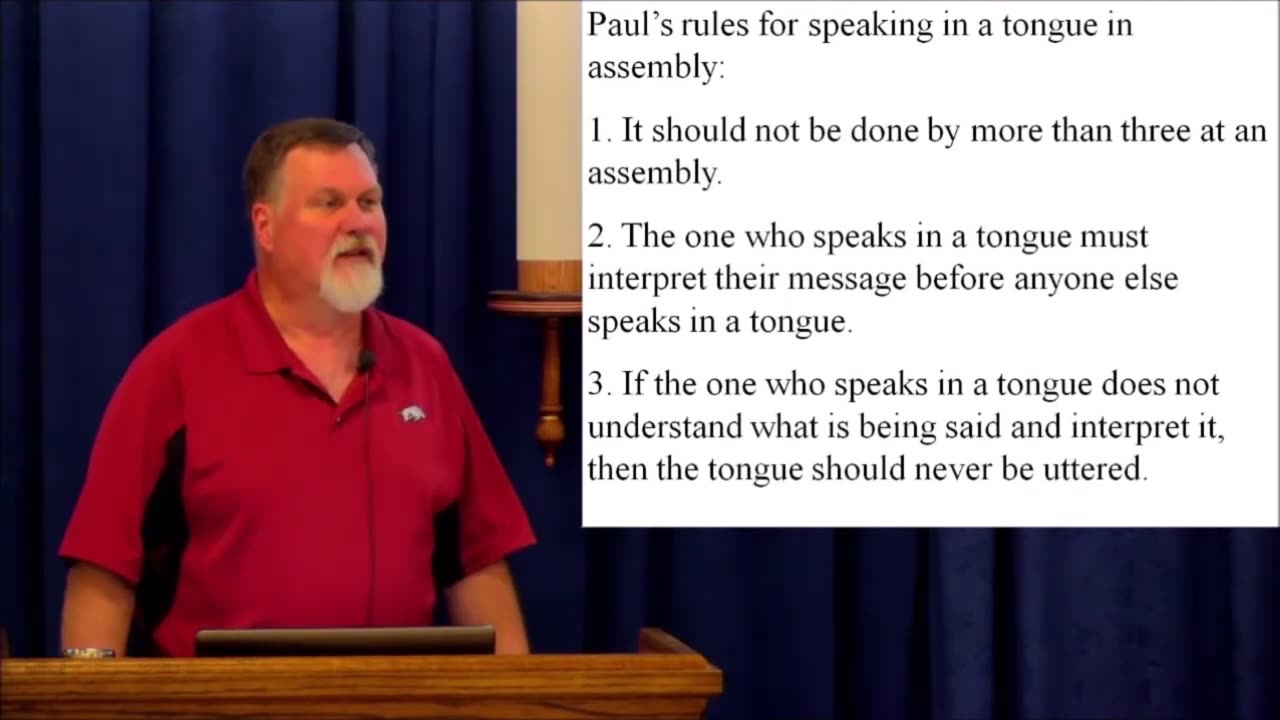Premium Only Content

1 Cor 13 & 14 - Without love, we are wasting our time. 2017
1 Cor 13:12
For now we see in a mirror dimly, but then face to face; now I know in part, but then I shall know fully just as I also have been fully known.
Paul makes the comparison of how we will see things much more fully when Messiah returns. He compares the way we see things now as to how we will see them to the way a child sees things and the way things are clearer when we are adults.
1 Cor 13:13
But now abide faith, hope, love, these three; but the greatest of these is love.
When Messiah returns, we will still have faithfulness and hope (assurance), but our love (actions) toward one another is the most important.
1 Cor 14:1
Pursue love, yet desire earnestly spiritual gifts, but especially that you may prophesy.
This chapter picks up where the previous chapter leaves off. Paul told us the importance of love in all things. Without love, we are wasting our time. This does seem to go against what I have commonly stated "Obey whether you like it or not." Obedience is the most important factor. However, our obedience should be out of love for Elohim and out of love for each other. That is what Paul is saying in chapter 13. In this chapter, Paul is going to discuss those that speak in a tongue. There does not seem to be any controversy in the other assemblies concerning this issue. What exactly were some in the assembly doing to cause Paul to write to them and tell them to be more orderly and for women to be silent in the assembly? In previous chapters, Paul spoke of envy, strife, and division in the assembly.
1 Cor. 1:10-12 Now I exhort you, brethren, by the name of our Lord Jesus Christ, that you all agree, and there be no divisions among you, but you be made complete in the same mind and in the same judgment. 11For I have been informed concerning you, my brethren, by Chloe’s people, that there are quarrels among you. 12Now I mean this, that each one of you is saying, “I am of Paul,” and “I of Apollos,” and “I of Cephas,” and “I of Christ.”
1 Cor 3:1-3 And I, brethren, could not speak to you as to spiritual men, but as to men of flesh, as to babes in Christ. 2I gave you milk to drink, not solid food; for you were not yet able to receive it. Indeed, even now you are not yet able, 3for you are still fleshly. For since there is jealousy and strife among you, are you not fleshly, and are you not walking like mere men?
1 Cor 11:18-19 For, in the first place, when you come together as a church, I hear that divisions exist among you; and in part, I believe it. 19For there must also be factions among you, in order that those who are approved may have become evident among you.
In chapter 12, Paul mentioned that they cannot all have the same gifts and the same roles. It appears that some were envious of others who did not get the honor in the assembly they felt they should get.
1 Cor. 12:19-26 And if they were all one member, where would the body be? 20But now there are many members, but one body. 21And the eye cannot say to the hand, “I have no need of you”; or again the head to the feet, “I have no need of you.” 22On the contrary, it is much truer that the members of the body which seem to be weaker are necessary; 23and those members of the body, which we deem less honorable, on these we bestow more abundant honor, and our unseemly members come to have more abundant seemliness, 24whereas our seemly members have no need of it. But God has so composed the body, giving more abundant honor to that member which lacked, 25that there should be no division in the body, but that the members should have the same care for one another. 26And if one member suffers, all the members suffer with it; if one member is honored, all the members rejoice with it
It appears that Paul will now get to the crux of the matter. It is likely the aforementioned envy, strife, and lack of honor was causing some in the assembly (apparently some women) to claim to be able to speak in a strange tongue, stand up and babble incessantly, and demand the attention they desire. The reason they did this is discussed later in this chapter. In this chapter, Paul will distinguish between speaking in a tongue (babbling) and speaking in tongues (languages). There is a noun inflection at the end of the Greek word for "tongue" that determines whether it is singular or plural. Paul is going to say that speaking in a tongue (singular) is not a thing to be desired. Rather, he wants those in the assembly to prophesy (profess Truth).
-
 LIVE
LIVE
LFA TV
13 hours agoLFA TV ALL DAY STREAM - MONDAY 8/25/25
12,149 watching -
 LIVE
LIVE
Surviving The Survivor: #BestGuests in True Crime
8 minutes agoLIVE Court: Wendi Adelson Testifies Against Mom, Donna Adelson, in Dan Markel's Murder Trial
115 watching -
 LIVE
LIVE
JuicyJohns
39 minutes ago🟢#1 REBIRTH PLAYER 10.2+ KD🟢
260 watching -
 1:14:57
1:14:57
JULIE GREEN MINISTRIES
2 hours agoRUSSIA IS ABOUT TO RELEASE SOMETHING THAT WILL CRUSH THE ESTABLISHMENT
33.8K113 -
 LIVE
LIVE
GritsGG
39 minutes agoWin Streaking! Coloring Hair @11AM PST~ Most Wins 3435+ 🧠
49 watching -
 LIVE
LIVE
Welcome to the Rebellion Podcast
19 hours agoMonday Funday - WTTR Podcast Live 8/25
351 watching -
 1:21:24
1:21:24
Game On!
15 hours ago $0.02 earnedTom Brady And The Las Vegas Raiders ARE BACK! 2025 NFL Preview!
23.9K1 -
 LIVE
LIVE
The Bubba Army
2 days agoShould RaJa Jackson Be Arrested? - Bubba the Love Sponge® Show | 8/25/25
2,095 watching -
 LIVE
LIVE
FyrBorne
14 hours ago🔴Warzone M&K Sniping: Builds So Strong They Think I'm Hacking
286 watching -
 LIVE
LIVE
BEK TV
2 days agoTrent Loos in the Morning - 8/25/2025
826 watching